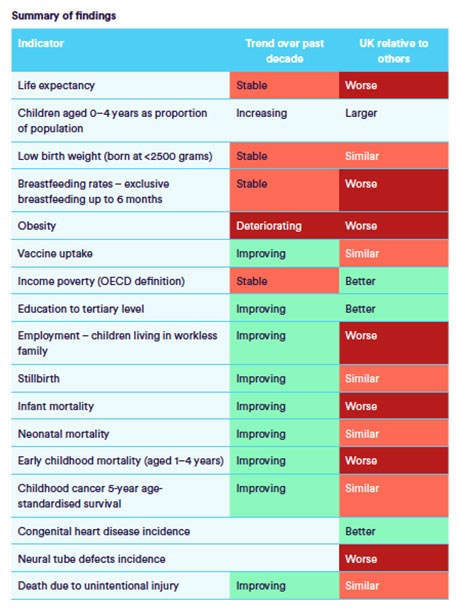Child health and wellbeing in UK falling behind other OECD nations
Thursday, March 15, 2018
British child health is lagging behind other countries, according to a new analysis.

Health outcomes for babies and young children in the UK are stalling in key areas including infant mortality and immunisation levels, and lagging behind most other high-income countries on mortality, breastfeeding and obesity rates, according to the first international analysis of British children’s health outcomes over time.
Separately, figures published by the Office for National Statistics have revealed that infant mortality rose from 2.6 neonatal deaths per 1,000 births in 2015 to 2.7 for every 1,000 births in 2016. The infant mortality rate (deaths within the first year of a child’s life) also rose between 3.7 to 3.8 per 1,000 live births over the same period.
The Royal College of Paediatrics and Child Health (RCPCH) and the Nuffield Trust joint report by NHS paediatrician and Nuffield Trust visiting fellow Dr Ronny Cheung, is based on analysis of 16 child health measures in 14 OECD countries between the early 2000s and the last year for which data are comparable.
The indicators examined included life expectancy, nutrition, immunisations, and deaths in early childhood.
The report International comparisons of health and wellbeing in early childhood found that child health outcomes had improved across nine of the 16 areas examined over the past decade, including reductions in the rate of infant deaths, increases in cancer survival, and a rise in the rate of immunisation.
For example, the proportion of children in the UK receiving two doses of the measles vaccine had grown by almost a fifth over ten years and the infant mortality rate had reduced by nearly a quarter, according to the research.
However, the report also said the rates of deaths for babies under a year old and tiny babies under 28 days had plateaued since 2013. In 2014, the UK had the fourth highest infant mortality rate among all comparable countries.
Similarly, rates of breastfeeding were found to be among the lowest in the world, with just 34 per cent of babies in the UK receiving any breast milk at six months old compared with 62.5 per cent in Sweden in 2010.
The UK was found by the research to have considerably more overweight or obese children than the average amongst high-income countries, and the second highest prevalence of babies born with neural tube defects, which can be prevented by taking folic acid.

Source: International comparisons of health and wellbeing in early childhood
The report also looked at social determinants of health, finding that while the UK had a comparatively low rate of child income poverty using an OECD definition, the proportion of children in relative income poverty is now back up to levels last seen in 2009/10.
The report concluded that despite ‘impressive’ progress in recent decades, the UK remains ‘a long way short’ of its ambition to be an international leader in fostering a healthy start for children.
The Nuffield Trust and RCPCH have called on the Government to do more to improve maternal and antenatal health promotion, address health and socioeconomic inequalities and protect public health budgets.
Nigel Edwards, chief executive of the Nuffield Trust, said, ‘It is a truism to say that looking after our youngest members of society reaps rewards in the future. And yet, with some honourable exceptions, child health is notably absent from much policy thinking at the moment and we are now falling behind our peers when it comes to several vital measures. It’s time for policymakers to take child health seriously before our somewhat mediocre international standing becomes even worse.’
Dr Russell Viner, president of the RCPCH, added, ‘Given that children and young people make up a quarter of the UK population, it’s a real failure of the system that child health gets so little political attention. Investing in child health makes both moral and economic sense – for every £1 you put in, you get an average of £10 back in terms of future productivity.
‘We want to see the UK Government develop a comprehensive cross-departmental child health strategy, which includes a “health in all policies” approach to policy making. It’s also crucial that some of the biggest threats to child health are tackled boldly; for example, tighter restrictions on junk food advertising to tackle obesity, the reinstatement of child poverty reduction targets and crucially the reversal of damaging public health cuts.’
Jonathan Ashworth MP, Labour’s shadow health secretary, said, ‘This powerful report must serve as an urgent wake up call to the scandal of child ill health in our nation.
‘Swingeing cuts to public health and early years services have resulted in child poverty rising, differences in life expectancy widening for the first time since 2011 and more obese children in our schools than almost any other high-income country.
‘Instead of bold action, this Government is driving through further cuts to children’s services and health visitors, a move blatantly against the interests of vulnerable children and their families.
'While the Tories neglect children’s health, improving the health and wellbeing of every child will be a priority for Labour.’
A Government spokesperson said, ‘This Government is committed to ensuring children get the best start in life — that's why we have introduced mandatory health visitor checks, a world-leading vaccination programme and robust plans to tackle childhood obesity.
‘Childhood mortality is at an all-time low, and we will continue to do everything we can to reduce the number of families who go through the tragedy of losing a child.’




